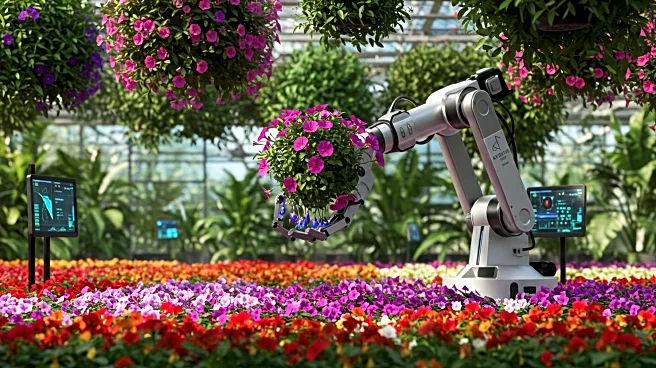What's Happening?
Maine's agriculture sector is leveraging artificial intelligence to optimize crop production for Valentine's Day. AI-powered precision agriculture is being used to improve the quality and sustainability of flowers, berries, and greenhouse products. This technology governs schedules, climate control, input use, and logistics, making Maine's agriculture more resilient and efficient. AI tools such as satellites, drones, and field sensors are employed to map soil moisture, nutrient status, and pest pressure. Computer vision is used to sort berries and blooms by size, color, and blemishes, enhancing packing line accuracy and reducing waste. Forecasting models adjust planting and harvest timing, while route optimization and real-time temperature monitoring extend the shelf life of perishable products.
Why It's Important?
The integration of AI in Maine's agriculture is significant as it enhances the resilience and efficiency of crop production, particularly for Valentine's Day, a peak season for flowers and berries. By optimizing resource use and improving product quality, AI helps local farmers meet holiday demand with premium products. This technological advancement supports Maine's economy by stabilizing supply chains and reducing waste, which is crucial for maintaining competitiveness in the agricultural market. Additionally, AI-driven practices contribute to sustainability by minimizing environmental impact through precise irrigation and fertilizer application.
What's Next?
As AI technology continues to evolve, Maine's agriculture sector is expected to further refine its precision farming techniques. This could lead to even greater efficiency and sustainability in crop production, potentially expanding the range of products available for Valentine's Day and other seasonal markets. Stakeholders, including farmers and retailers, may increasingly adopt AI tools to enhance their operations and meet consumer demand for high-quality, locally sourced products. The ongoing development of AI applications in agriculture may also prompt discussions on ethical use and the balance between technology and human expertise.
Beyond the Headlines
The use of AI in agriculture raises important ethical and cultural considerations. While AI can significantly improve efficiency and reduce waste, it also necessitates careful management to ensure that human expertise remains central to farming practices. The shift towards AI-driven agriculture may influence cultural perceptions of farming, emphasizing technological innovation alongside traditional methods. Additionally, the focus on sustainability and traceability in AI applications aligns with broader societal trends towards environmentally conscious consumption, potentially influencing consumer preferences and market dynamics.









